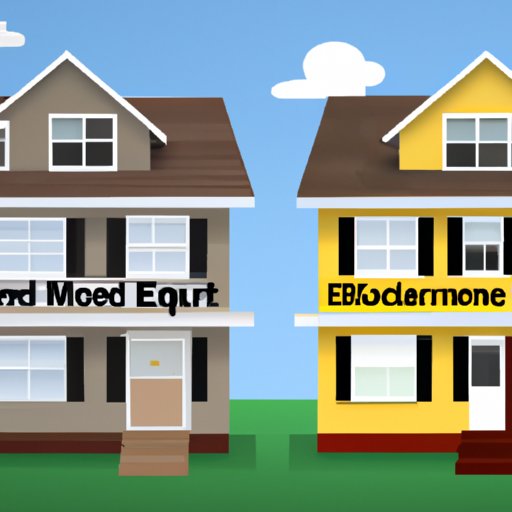Introduction
A second mortgage is a loan that uses the equity you have built up in your home as collateral. It is secured by the value of your property, which gives lenders the assurance that they will be able to get their money back if you default on the loan. A second mortgage can help you access the funds you need for a variety of purposes, such as home improvements or consolidating debt. In this article, we’ll explore how a second mortgage works, what the requirements are, and the pros and cons of taking out a second mortgage.

How to Secure a Second Mortgage
Securing a second mortgage requires meeting certain criteria set by lenders. Typically, you must have at least 20% equity in your home, as well as good credit and a steady income. Your lender may also require an appraisal of your home to determine its current market value.
It’s important to understand the interest rates associated with a second mortgage. Lenders typically charge higher interest rates than those associated with first mortgages because second mortgages are riskier investments. While interest rates vary depending on your loan terms and creditworthiness, they can range anywhere from 5-8%.
Benefits of a Second Mortgage
Taking out a second mortgage can provide several benefits. One of the most common reasons people take out a second mortgage is to gain access to additional funds. This can give you the flexibility to make home improvements, buy a new car, consolidate debt, or pay for college tuition.
Another benefit of a second mortgage is the potential for tax advantages. Depending on the circumstances, you may be able to deduct some or all of the interest you pay on your second mortgage from your taxes. It’s important to consult with a tax professional to determine whether this is an option for you.
Managing a Second Mortgage
Managing a second mortgage is similar to managing any other loan. Make sure you understand all of the terms of your loan and stay current on payments. You should also consider setting aside extra funds each month in case you need to make additional payments. Doing so can help you avoid paying late fees and maintain a good credit score.
It’s also important to keep track of your finances and make sure you’re not overextending yourself. Taking out a second mortgage can be a great way to access additional funds, but it’s important to make sure you’re able to afford the payments. If you find yourself struggling to make payments, contact your lender right away to discuss your options.

Comparing Home Equity Loans and Second Mortgages
A home equity loan and a second mortgage are similar in many respects; however, there are a few key differences between the two. Both loans use the equity in your home as collateral and typically have higher interest rates than first mortgages. However, a home equity loan is typically a lump sum loan, whereas a second mortgage is a line of credit.
One of the main differences between a home equity loan and a second mortgage is the repayment period. Home equity loans usually have shorter repayment periods, while second mortgages may have longer repayment periods. Additionally, a home equity loan may require you to make a single balloon payment at the end of the loan, while a second mortgage does not.
Conclusion
A second mortgage can be a great way to access additional funds, but it’s important to understand the pros and cons before taking out a loan. On the plus side, a second mortgage can offer increased financial flexibility and potential tax advantages. On the downside, second mortgages come with higher interest rates and can cause you to overextend yourself financially if you’re not careful. Before taking out a second mortgage, make sure you understand all of the terms and conditions and have a plan for making payments.
In conclusion, a second mortgage can be a great way to access additional funds, but it’s important to understand the risks involved. Make sure you know the terms of your loan and are able to afford the payments. With careful planning and responsible decision-making, a second mortgage can be a great tool for accessing the funds you need.
(Note: Is this article not meeting your expectations? Do you have knowledge or insights to share? Unlock new opportunities and expand your reach by joining our authors team. Click Registration to join us and share your expertise with our readers.)
